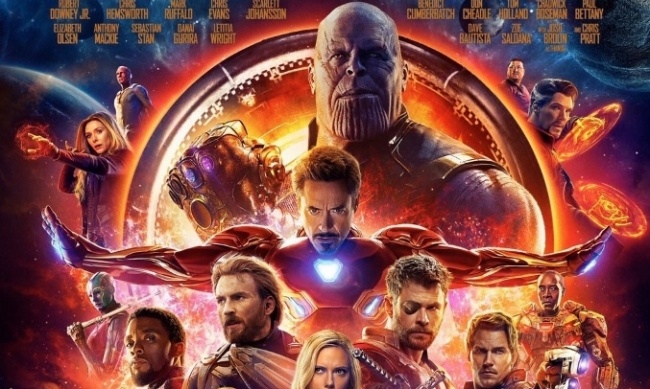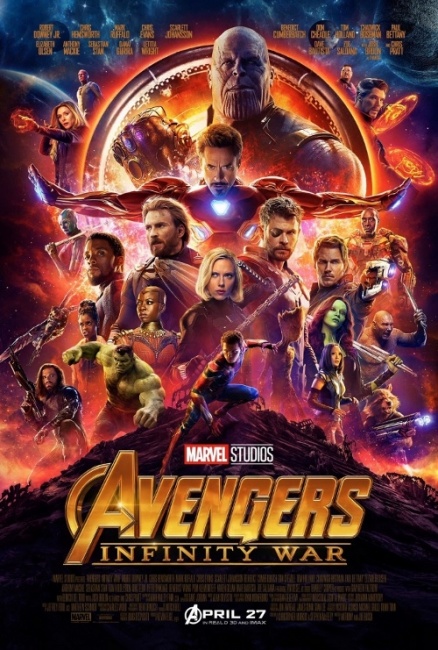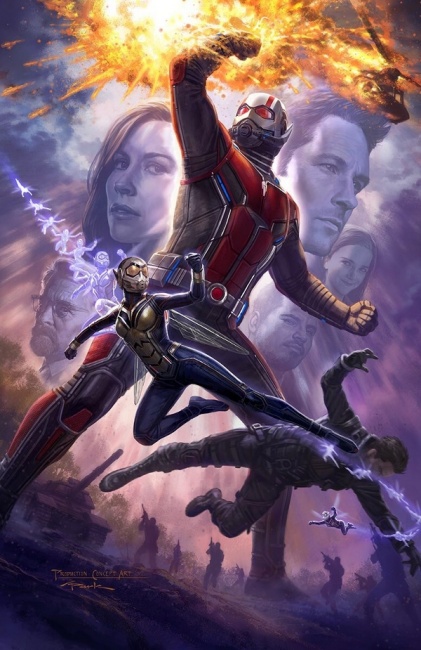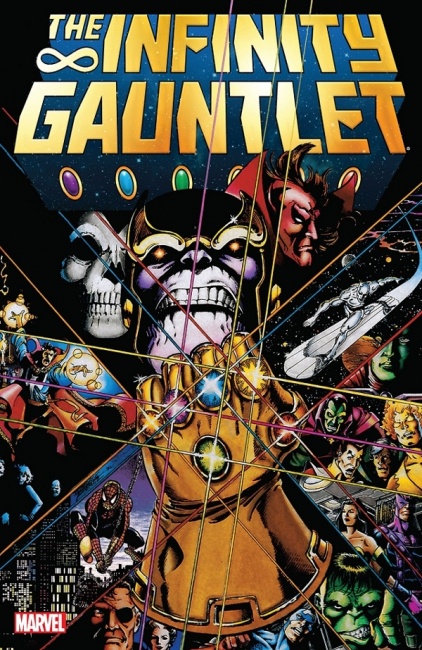See any good movies this weekend?
It turns out that if you’re a comics fan, an American or a human being on planet Earth, you are more likely to have spent money seeing Avengers: Infinity War than anyone has on any other movie.
OK, don’t think too hard about that particular claim, but look at the numbers. According to Box Office Mojo, Infinity War racked up a record-setting $258 million domestic and $630 million worldwide in its first weekend – and that’s before it’s sold a single ticket in the world’s largest market, China. $630 million worldwide is just about half of what Marvel’s previous record-setting blockbuster, Black Panther, has made in ten weeks. So, yeah. That’s a good opening.
Moreover, if you saw Infinity War and liked it even a little bit, you probably want or need to go see it again, because – minor spoilers – a lot of stuff happens. And, if you blink, you might miss your favorite Marvel character’s brief moment in the sun. Sixty seconds of screen time is not enough to savor Black Widow and Okoye opening a can of whup-ass on one of Thanos’s minions, for example, but because of a traffic jam on the studio backlot, that’s about all the time they get. Want to see more? Buy another ticket. And don’t skimp on the IMAX, because this movie needs every single square inch of surface area that the big screen allows to burn itself into your brain.
Marvel’s ten year victory march. The financial success of Avengers: Infinity War seems inevitable, even over-determined, but let’s step back a minute and think about this. Try giving an elevator pitch of this movie to a fan in 1998, or even 2008. They’d think you were nuts.
You know who didn’t think this was nuts? Walt Disney Company CEO Bob Iger. The $4 billion that Disney spent to acquire Marvel in 2009 is starting to look like a pretty good deal, wouldn’t you say? Remember, though, at the time, it was anything but a no-brainer. Marvel Studios had one surefire hit (Iron Man) with a sequel in the works; one two-time loser (The Hulk), and plans for Thor and Captain America. They didn’t control the rights to their most household-name properties Spider-Man, the X-Men and the Fantastic Four, and Warner Bros was already off to the races with a Batman franchise that was a critical and box-office hit.
Imagine trying to convince the Mouse that, in ten years, Marvel would not only run the table on every leg of its core Avengers franchise, but also be dominating the box office universe and dusting off its major competitors with a snap of its fingers on the backs of Doctor Strange, Black Panther, and Guardians of the Galaxy. Making a hit out of Ant-Man is just dunking on a defeated opponent. Making a sequel to Ant-Man? That’s flat out mockery.
And yet, here we are. Marvel is setting records with a movie that – I say this with affection – makes just about no sense if you haven’t seen at least 10 other Marvel movies, and preferably all 18, plus a couple of seasons of Marvel’s Agents of S.H.I.E.L.D. for good measure. And it’s a movie that it’s fair to say will have fans coming back for a second helping about a year from now.
Top of the food chain. Amazingly, Marvel’s multi-billion dollar box office haul is just the tip of the iceberg. The real money comes from product licensing. According to the Licensing Industry Merchandisers Association (LIMA), about 45% of the $262 billion racked up by global licensing worldwide in 2016 came from entertainment characters. That’s $118 billion worth of apparel, toys and games and other merchandise, divvied up among all the popular brands. Disney is believed to command the Lion King’s share of that figure based on its own brand plus subsidiaries Pixar, Lucasfilm and Marvel. However you want to slice that particular pie, the licensing revenue looks to be a magnitude higher than box office revenue, which is itself a magnitude higher than publishing revenue from the same stable of characters.
What’s the story? We can lament all day why the dollar flow bears an inverse relationship to story content – that is, why Iron Man coffee cups and Black Panther hoodies bring in more bucks than comic books that actually create the mythology around those characters month by month, but that’s where the business is right now.
I’d like to think that a movie like Avengers: Infinity War could change that, at least a little bit. If any movie in the world were to send casual fans racing to their local comic shops or favorite digital comics app to bone up on backstory, it’s this one. Infinity War is based on an actual comic storyline or three. The character of Thanos hews pretty close to Jim Starlin’s design, even if his motives and character are a little bit different in the film. There are ways to get information from comics that will legitimately enrich your experience watching the movie, and maybe audiences will, for once, avail themselves of those resources.
Warren Ellis issued an instant-classic critique of the film over the weekend, saying "It is not a movie. It is a brand manifestation that wants to have prolonged, eager and reasonably skilled cultural sex with you. It wants your experience with its content™ to be satisfying and it hopes you are pleased enough to return for further interaction with the Brand. This is a very 21C thing. I like it for that alone, to be honest. "
I’d add that the Brand, in this case, isn’t just about logos and cultural tropes. It’s about a huge cast of characters that Marvel has systematically gotten us to pay attention to and care about. It’s about a plot that’s been brewing for at least half a decade, with breadcrumbs scattered across post-credit scenes that millions of fans have waited for, cross-legged and suffering after 2.5 hours and a half-liter of Coke. It’s about that shared experience of waiting for a payoff and then… well, maybe waiting some more.
Manufacturing that kind of success isn’t easy for any brand, much less a brand with such a narrow cultural footprint as Marvel Studios had in the 00s, denuded of its top properties and competing for mindshare not just with DC, but with Harry Potter, Twilight, Hunger Games, Jason Bourne, Mission: Impossible, The Lord of the Rings, and a half-dozen other viable action-fantasy franchises.
Marvel Studios managed to pull it off, even in the face of expectations that would have seen an opening of less than $500 million worldwide as a disappointment. As we gape in either awe or disgust as Disney counts its money, let’s keep in mind that this was neither easy nor inevitable.
The opinions expressed in this column are solely those of the writer, and do not necessarily reflect the views of the editorial staff of ICv2.com.
Rob Salkowitz (@robsalk) is the author of Comic-Con and the Business of Pop Culture.

Column by Rob Salkowitz
Posted by Rob Salkowitz on April 30, 2018 @ 4:55 pm CT
MORE COMICS
Madison, Wisconsin on August 10, 2025
August 15, 2025
We visited the large Barnes & Noble store in Madison, Wisconsin on a Sunday afternoon, and found manga and merch displays expanded.
Superheroes are Fresh, Author Titles are Stale, and Manga Just Keeps Plugging Along
August 14, 2025
DC Comics' Compact Comics and Marvel Comics' Premier Editions take over the Superhero chart with a flurry of newer titles, while the Author chart has just one new release.
MORE COLUMNS
Column by Scott Thorne
August 11, 2025
This week, columnist Scott Thorne notes a new twist in the Diamond Comic Distributors saga and shares his thoughts on the Gen Con releases that will make the biggest impacts.
Column by Jeffrey Dohm-Sanchez
August 7, 2025
ICv2 Managing Editor Jeffrey Dohm-Sanchez lays out the hotness of Gen Con 2025.











